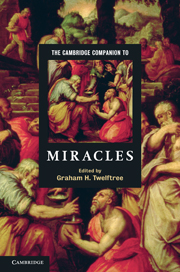Book contents
- Frontmatter
- Introduction
- Part I Fundamental issues
- Part II Miracles in antiquity and the Middle Ages
- 3 Miracles in the Hebrew Bible
- 4 Miracles in the Greek and Roman world
- 5 Miracles in Second Temple and early rabbinic Judaism
- 6 The miracles of Jesus
- 7 Miracles in early Christianity
- 8 Miracles In The Middle Ages
- Part III Miracles and major religions
- Part IV Miracle today
- Index
4 - Miracles in the Greek and Roman world
from Part II - Miracles in antiquity and the Middle Ages
Published online by Cambridge University Press: 28 May 2011
- Frontmatter
- Introduction
- Part I Fundamental issues
- Part II Miracles in antiquity and the Middle Ages
- 3 Miracles in the Hebrew Bible
- 4 Miracles in the Greek and Roman world
- 5 Miracles in Second Temple and early rabbinic Judaism
- 6 The miracles of Jesus
- 7 Miracles in early Christianity
- 8 Miracles In The Middle Ages
- Part III Miracles and major religions
- Part IV Miracle today
- Index
Summary
In Christological terms a miracle is a sēmeion (‘sign’) or, more prosaically, an ergon (‘deed’), these being the words most commonly used by Jesus to describe the miracles he performs. Other words found in the gospels include teras (‘wonder’) and dunamis (‘power’). Collectively they imply that miracles were primarily perceived as signifiers that had far greater value and meaning than simply their impact upon the phenomenal world; or as St Augustine (City of God 22.10) put it, their purpose was that ‘faith may prosper’.
In Graeco-Roman terms, by contrast, a miracle was regarded more as a sociological event, one that generated a sense of astonishment and wonder in those who witnessed it. This can be deduced from the fact that the nearest Greek and Latin equivalents for ‘miracle’ in the pre-Christian era are thauma from thaumazō and miraculum from miror. Both verbs (thaumazō and miror) mean literally ‘to wonder at, be amazed at’. In other words, both languages highlight the reaction of spectators to ‘that which is amazing’. Since what is amazing is not invariably or necessarily the same as what is miraculous, it follows that neither thauma nor miraculum carries the same force as the Christian concept of ‘miracle’. Faithful to the Greek, the Latin Vulgate renders ‘miracle’ by signum, prodigium and virtus; miraculum is only used in patristic and later theology. In sum, there is no Greek or Latin word that differentiates an act, sight or occurrence that is ‘truly’ miraculous from one that is, quite simply, worthy of wonder. In the plainest terms, a goal scored from behind the halfway line could, without hyperbole, have been appropriately deemed ‘miraculous’.
- Type
- Chapter
- Information
- The Cambridge Companion to Miracles , pp. 75 - 94Publisher: Cambridge University PressPrint publication year: 2011
- 4
- Cited by



